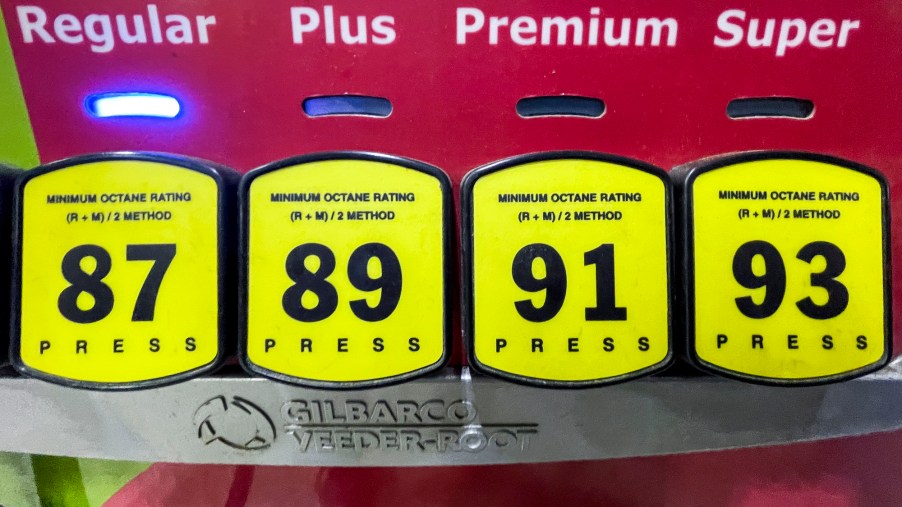
Do All Luxury Cars Need Premium Gas?
When you fill your car at a gas station, you’ll see various types of fuel, like unleaded and diesel. You’ll also see different octane ratings of the gas at the pumps, such as 87, 89, 91, and 93, indicating whether it’s regular or premium fuel. Nowadays, we try to do whatever we can to get better gas mileage. Should we be using higher-octane fuel to accomplish this?
We’ll explain the differences between octane ratings, how beneficial they are for your car, and whether you could damage your vehicle by using regular instead of premium gas. With many families buying luxury SUVs nowadays, which one should you be using?
Gas octane ratings explained
Gas stations offer various octane levels, but generally, you’ll find 87, 89, 91, and 93 octane gas at pumps. 87 and 89 indicate lower octane ratings or regular gasoline, The Drive reports. The higher numbers, usually 91 and 93, indicate premium fuel.
However, that doesn’t mean you have to use the highest-octane gas. Some stations don’t offer premium fuel, so it’s best to find one that sells 91- or 93-rated gas. Some areas even offer fuel with a higher octane rating than 93.
If you drive a vehicle that doesn’t require premium gas, you can still fill your tank with a higher-octane fuel. For the most part, it won’t make your car faster or give it better gas mileage. But it will cost more. So you you shouldn’t use premium gas unelss your vehicle requires it.
Of course, if for some reason you don’t mind paying the extra for premium gas, you can fill up with the higher-octane fuel without fear of ruining your engine. You’d probably be better off using fuel cleaners, though, because they can help keep your engine clear of debris without the cost of the premium fuel every time you pull up to the pump.
Why do luxury cars and high-performance vehicles require premium fuel?
You might be wondering why if high-octane fuel costs so much, would a luxury or high-performance vehicle require its use. The major difference between premium and regular gasoline, besides the price, is the fact that the high-octane fuel helps clean out the internal engine parts and reduces carbon buildup. It does not, however, offer you more fuel efficiency.
There’s less likelihood of rust happening within the fuel system. With luxury cars or high-performance vehicles, nowadays, you’re running on a high-compression engine. That means it needs fuel that will burn hotter and leaner in order to run properly.
Regular gasoline can’t provide that. It would cause mistimings of combustion or explosions happening in the engine. These motors can handle them, but if the timing is off, the engine will start to make a knocking noise.
Can regular gas damage an engine that needs high-octane fuel?
Related: Here’s What Actually Happens if You Use the Wrong Fuel in Your Car
So, can regular gas damage an engine that needs high-octane fuel? The answer is yes and no. If you’re out and about and need to fuel up but the nearest gas station offers only regular-octane fuel, you could get by until you found premium gas somewhere else. You shouldn’t do this often, and you should put premium fuel in the tank as soon as possible.
Lower-octane fuels could cause knocking in your luxury car’s engine. Long-term damage won’t occur with a couple of instances of putting in cheaper fuel, but if you continually use gas that your car shouldn’t take, you’ll wear out the motor quickly. These days, auto manufacturers build engines that can adjust to the lower-grade fuel if necessary, but you shouldn’t rely on it too often.
You could put only a minimal amount of regular gas in the tank to get to the next station if you’re worried about ruining your engine. But, of course, you need to put in enough to get there.
Premium fuel can be expensive, but in some vehicles, higher-octane gas is necessary to run properly. If your vehicle doesn’t call for it, though, there’s no need to spend the extra money at the pump.


